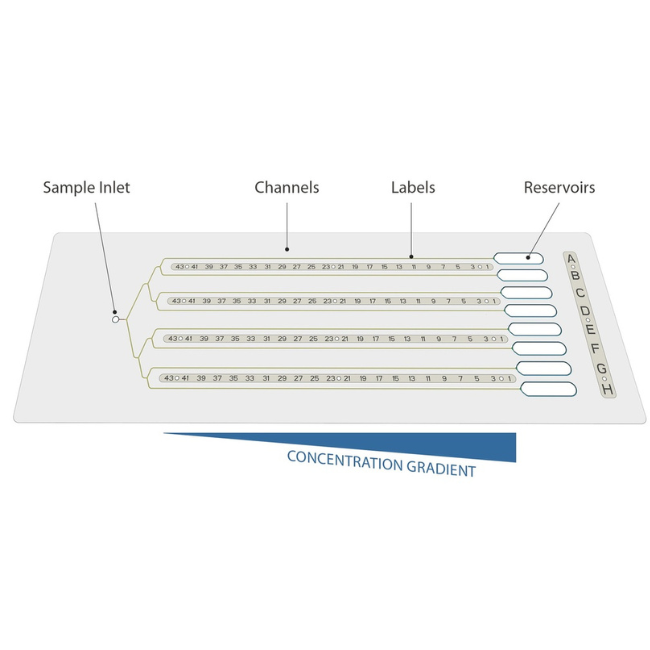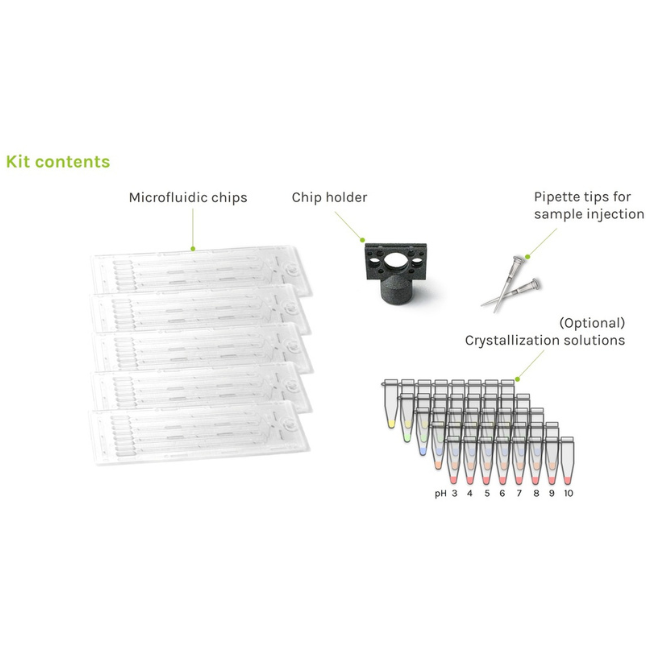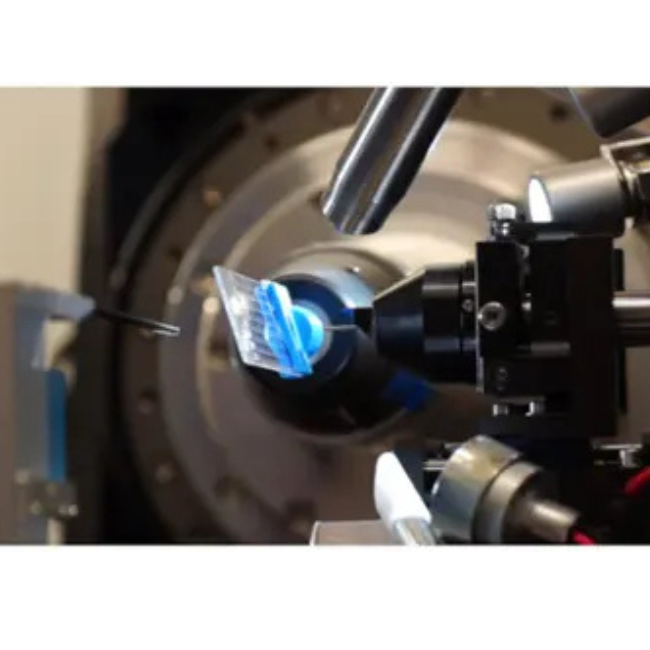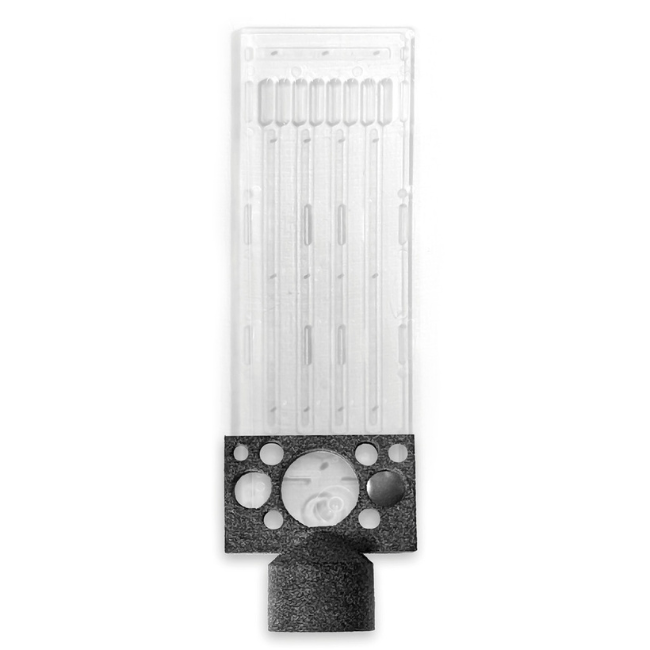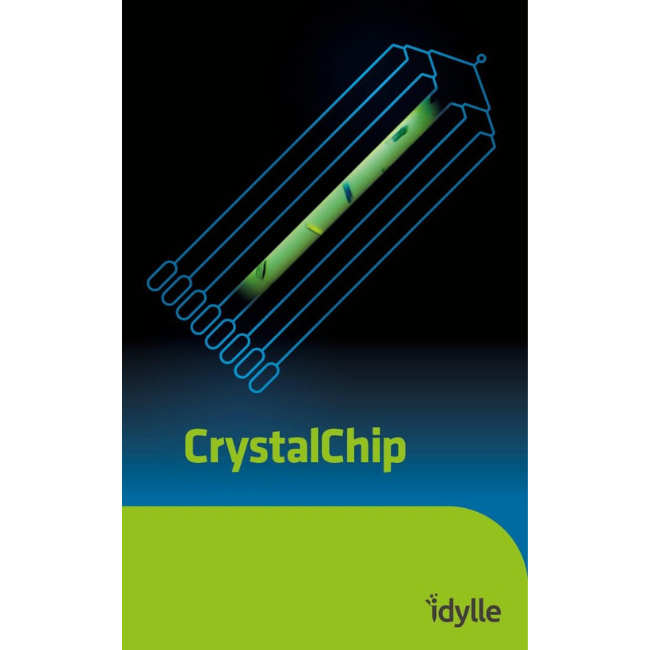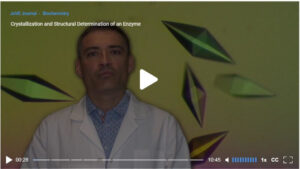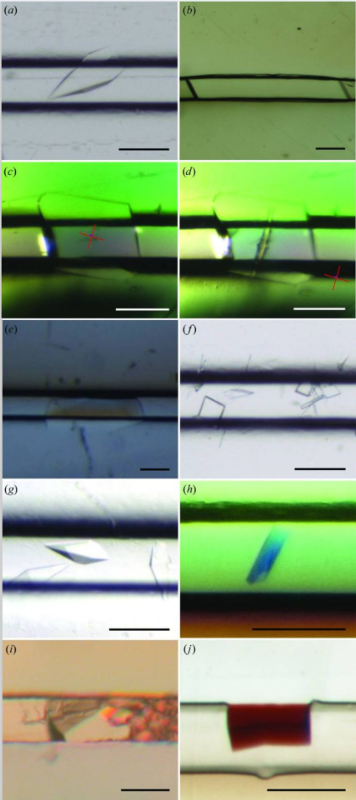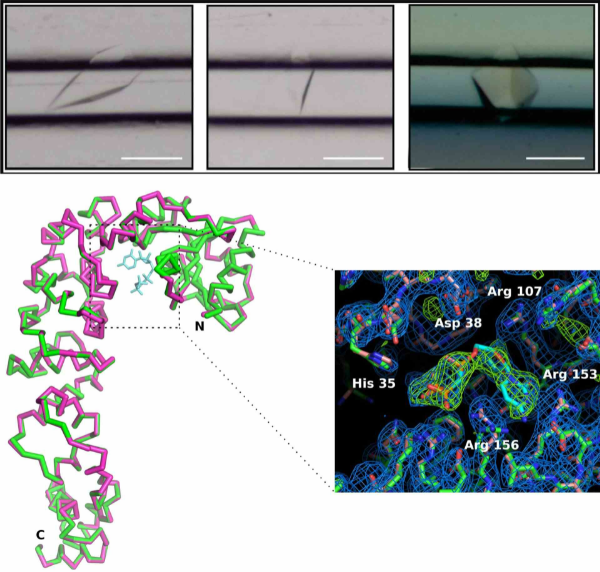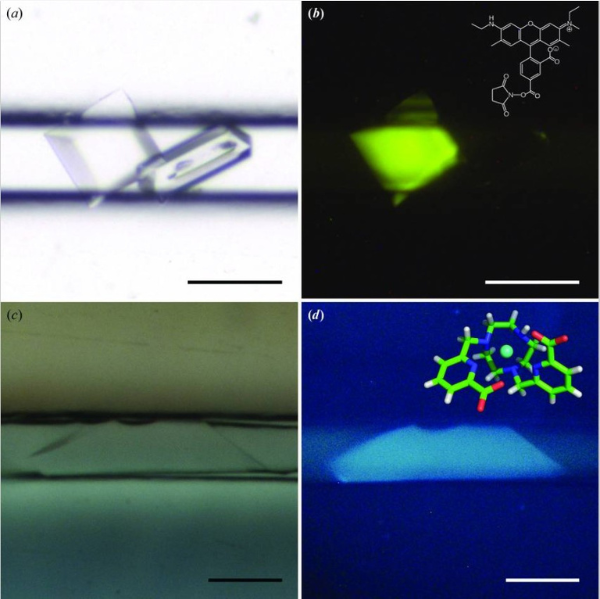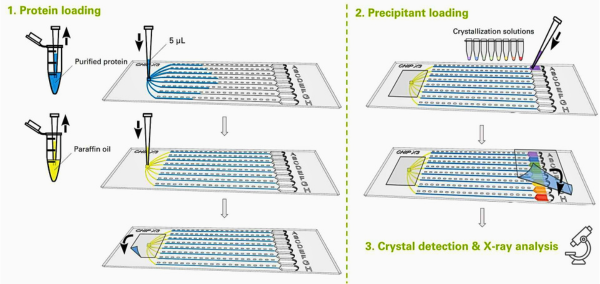CrystalChip Microfluidic Chips For Protein Crystallization
CrystalChip is a microfluidic chip for protein crystallization. It is the size of a microscope slide and integrates all steps from biomacromolecule crystallization to high-resolution structural analysis. Crystals are produced by counter-diffusion, can be directly visualized, soaked with ligands and analyzed in situ for crystal structure determination. Available in four variations.
Product Information
Whether you want to use CrystalChip for routine screening of crystallization conditions, or as a complementary tool to optimize your conditions, add ligands or perform in situ analyses, there are various kit formats to fit your purposes.
Kit variations are
CrystalChip Microfluidic Chip Discovery Kit (5 chips) SKU M-ICC-DK5 - Contains 5x microfluidic chips, 10x 10µL pipette tips for sample injection and 1x chip holder
CrystalChip Microfluidic Chip Extended Kit (30 chips) SKU M-ICC-DK30 - Contains 30x microfluidic chips, 60x 10µL pipette tips for sample injection and 1x chip holder
CrystalChip Microfluidic Chip Discovery Screening Kit (5 chips + crystallization solutions) SKU M-ICC-DK5-CS - Contains 5x microfluidic chips, 10x 10µL pipette tips for sample injection, 1x chip holder and 40x ready-to-use crystallizing mixes
CrystalChip Microfluidic Chip Extended Screening Kit (30 chips + crystallization solutions) SKU M-ICC-DK30-CS - Contains 30x microfluidic chips, 60x 10µL pipette tips for sample injection, 1x chip holder and 40x ready-to-use crystallizing mixes
All kit options include some 10 µL pipette tips specifically adapted to the sample injection port, as well as a holder for direct chip mounting on goniometers using standard magnetic heads.
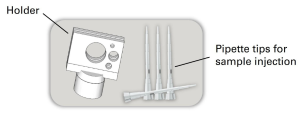
CrystalChip screening kits
In addition to the basic kit contents, screening kits also include 40 ready-to-use crystallization solutions to perform highly-efficient screening of crystallization conditions for a wide range of proteins with only 5 chips. These crystallizing cocktails are composed of concentrated PEG & ammonium sulphate solutions with pH ranging from 3 to 10. They were specifically optimized for use with the counter-diffusion method, and were shown to successfully crystallize 100% of tested proteins [1]. It is strongly recommend using these when performing initial screening of crystallization conditions.
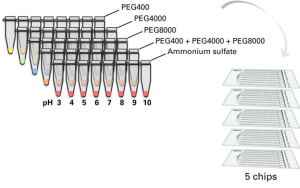
Why should you use CrystalChip?
Take advantage of the continuous gradient effect and use CrystalChip as an alternative to vapor diffusion or batch methods for a simpler and cost-effective routine screening of crystallization conditions. With only 5 chips and 25 µL of purified protein, create the 40 precipitant gradients that were shown to successfully crystallize 100% of tested proteins [1]. CrystalChip also provides a perfect system to optimize and refine pre-selected crystallization conditions in a convection-free environment.
CrystalChip also provides a versatile system for researchers who would like to perform various kinds of analyses on their crystals: X-ray crystallography, serial crystallography and direct optical imaging methods (fluorescence imaging, polarized light, spectroscopy, etc) can be performed in situ as the chip is at a standard microscope format and can be clipped to synchrotron beamlines. Crystals can be treated with substrates thanks to the microfluidic channels.
Because it is very simple to use and does not require large volumes of purified proteins, CrystalChip can also provide a useful complementary tool to quickly generate X-ray crystallographic atomic models alongside cryo-EM workflows. This can be particularly useful if you want to get a more complete structural picture of a molecule, dock atomic models into a cryo-EM map or resolve small or highly dynamic structures that may present challenges for cryo-EM.
How does CrystalChip work?
CrystalChip is composed of a single injection port to load 5 µL of purified protein, connected to 8 separate microfluidic channels in which individual concentrated crystallizing solutions are loaded. Once injected, crystallizing agents immediately diffuse into the channels and create concentration gradients evolving dynamically, a very favorable convection-free environment to trigger nucleation & growth of high-quality crystals. Once an equilibrium is reached, formed crystals can be safely stored and transported for months. Switch to the counter-diffusion method and be sure to never miss the crystallization point
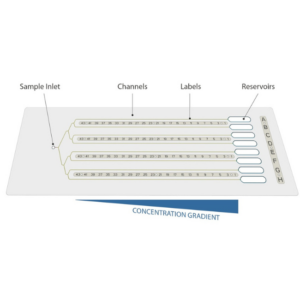
Use less, get more: thanks to its 4.5 cm long channels, CrystalChip allows you to explore a continuum of supersaturation states and is highly efficient at screening potential nucleation conditions while using minimal sample amounts. With only 5 chips, or 25 µL of purified protein, you can quickly try out 40 crystallizing cocktails at infinite concentrations instead of testing hundreds of individual conditions using standard vapour diffusion or batch methods.
Simplify your biocrystallography workflow: CrystalChip can be easily positioned on goniometers and translated in the X-ray beam, allowing for direct analyses of crystals inside the chip at room temperature and without handling.
Increase your 3D structure accuracy: because all analyzes can be done in situ, CrystalChip preserves the crystal quality and diffraction properties, avoids crystal damage due to handling and allows structure determination in more physiological conditions compared to cryo-crystallography.
Real-time optical readouts: thanks to its transparent material and standard microscope slide format, the chip can be directly placed on a microscope stage or in a crystal imager to monitor crystal formation, protein-ligand interactions and to select the best candidates for structural studies. Once formed, all crystals are on a same focal plane with no risk of evaporation or contamination. Imaging crystals has never been easier!
CrystalChip has been successfully used to crystallize various soluble & membrane proteins (enzymes alone and in complex with substrates, nanobodies, proteases, lipases, tRNA synthetases, hemoglobin) and an RNA duplex. Find out detailed examples of CrystalChip uses in the Results & Publications sections.
Discover more on CrystalChip & the counter-diffusion method by hearing directly from its inventor:
Applications of CrystalChip
Biomacromolecule crystallization: use it as a routine screening tool for finding the right crystallization conditions, refine your conditions after an initial screening or increase your chance of success when working with recalcitrant proteins.
On-chip treatments: external compounds can be loaded in the channels throughout the crystallisation process (i.e. in situ crystal soaking with ligands) for substrate catalysis, ligand screening in fragment-based drug design or phasing purposes.
Crystal imaging: using standard microscopy & spectroscopy methods (phase contrast, UV-illumination, fluorescence imaging, polarized light, etc). A useful method to select best candidates for structural studies or investigate fundamentals of crystal nucleation and growth processes in different conditions, and a smart tool for educational and demonstration purposes!
In situ structural analysis by serial crystallography: thanks to a dedicated holder, the chip can be directly positioned on synchrotron beamlines or XFELs for structural characterization using serial protocols at room temperature.
Crystal storage, handling & shipment: as all steps are performed in situ without handling, crystals can be safely stored for months or transported in the chip while preserving their intrinsic quality.
CrystalChip can provide a straight-forward complementary tool to use alongside single particle cryo-EM if you need to maximize resolution and detail, resolve small or highly dynamic structures that may present challenges for cryo-EM, boost your data collection speed or simply to address different aspects of the sample.
CrystalChip can directly be mounted on Synchrotron beamlines
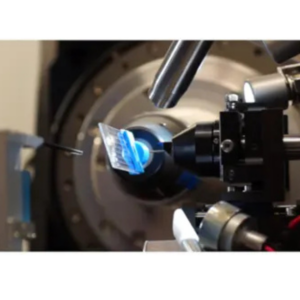
Storage: Unused chips can be stored indefinitely when protected from light.
[1] Efficient Screening Methodology for Protein Crystallization Based on the Counter-Diffusion Technique. Luis A. González-Ramírez, Carlos R. Ruiz-Martínez, Rafael A. Estremera-Andújar, Carlos A. Nieves-Marrero, Alfonso García-Caballero, José A. Gavira, Juan López-Garriga, and Juan M. García-Ruiz. Crystal Growth & Design 2017 17 (12), 6780-6786. DOI: 10.1021/acs.cgd.7b01353
